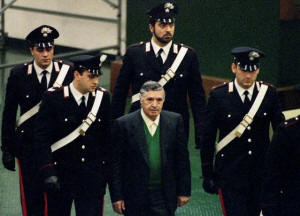|
Mob boss and mass murderer Riina dies of
natural causes
 Send a link to a friend
Send a link to a friend
 [November 17, 2017]
By Steve Scherer [November 17, 2017]
By Steve Scherer
ROME (Reuters) - Salvatore "Toto" Riina,
the Sicilian Mafia's most powerful boss of the 20th century who was
convicted for ordering dozens of murders, died of natural causes early
on Friday after almost a quarter of a century in jail.
Riina, who turned 87 on Thursday, died in the prison ward of a hospital
in Parma, the northern Italian city where he had been serving 26 life
sentences for homicides committed between 1969 and 1992. His victims
included the two magistrates who led the campaign to bring mob bosses to
justice.
He had fallen into a coma after complications during surgery a few days
ago, and his family had been given permission to be by his side on
Thursday, the Justice Ministry said.
Nicknamed "the Beast", “Riina began his violent criminal career on the
streets of Corleone after World War Two and became the Sicilian Mafia's
boss of bosses when it reached its 20th century apex.

Riina oversaw a flourishing economic period for organized crime group
Cosa Nostra, or "Our Thing", when it was trafficking heroin to the
eastern United States and pulling the levers of political power in
Palermo and Rome.
But due to Riina's savagery, hundreds of mobsters broke their code of
silence in the 1980s and 1990s and testified against him, allowing
magistrates Giovanni Falcone and Paolo Borsellino to uncover the
long-hidden secrets of Cosa Nostra and prosecute its leaders for the
crimes of its soldiers.
Riina's January 1993 arrest, after more than 20 years as a fugitive,
came just months after Falcone and Borsellino were blown up on his
orders, and coincided with the tumultuous downfall of Italy's corrupt
post-war political system.
Since then, Riina has been held under high security with little access
to his family in accordance with a law written to prevent bosses from
commanding from prison. However, he remained a powerful figure within
the mob even behind bars and refused to cooperate with investigators
until the end.
POWER STRUGGLE
Matteo Messina Denaro, a Riina ally who has been a fugitive for 25
years, is the highest ranking boss still at large, but it is unlikely he
will be able take power, John Dickie, a British historian and author of
the book "Cosa Nostra", told Reuters.
"Cosa Nostra is internally and politically divided in a way that makes
it almost ungovernable, and this division dates back to Riina's campaign
for power in the 80s," Dickie said.
Riina's surviving foes within Cosa Nostra had close ties to North
America, and they are the ones most likely to seek a shift in the crime
syndicate's balance of power.

"Because the Sicilian Mafia is struggling, it needs to renew its access
to the United States, which has been crucial to the organization since
the 1880s," Dickie said.
Given various nicknames over the years - Toto, Shorty, the Beast among
them - Riina was 19 when he shot a man dead during a gang fight in
Corleone and spent six years in prison, a rite of passage for a mafioso.
When he returned to Corleone, he and his childhood friend Bernardo
Provenzano, who would lead Cosa Nostra after Riina's arrest, fell under
the sway of Luciano Leggio.
Leggio took over the Corleone mafia with Riina and Provenzano at his
side by killing the town's wartime mafia boss, medical doctor Michele
Navarra, in 1958. U.S. author Mario Puzo would later name the main
character in "The Godfather" after the town.
[to top of second column] |

Mafia boss Toto Riina is escorted by Italian Carabinieri officers as
he arrives at the court house in Palermo, Italy December 1, 1993.
REUTERS/Tony Gentile/File Photo

In 1969, Riina and Provenzano led a hit squad against feared boss
Michele "the Cobra" Cavataio, ambushing him inside an office in
Palermo, killing the Cobra, another mafioso and two innocent
bystanders.
The so-called "Lazio Street Massacre" gave the Corleone clan a
foothold in Sicily's capital and a post on Cosa Nostra's governing
body, the "Commission", and the arrest of Leggio in 1974 made Riina
the acting boss of the Corleone crime family.
"THE SLAUGHTER"
The 1981 murder of mob boss Stefano Bontate signaled the beginning
of a two-year killing spree known as "The Slaughter", in which Riina
sought to annihilate his many rivals.
Fearing for their lives and for those of their families, hundreds of
mobsters broke their code of silence, or omerta, and cooperated with
investigators.
The turncoat testimony was a key component in Falcone and
Borsellino's landmark case against Cosa Nostra, which in January
1992 ended by holding mob bosses responsible for crimes committed by
their underlings.
Two months later, mafia assassins gunned down Salvo Lima, Prime
Minister Giulio Andreotti's right-hand man in Sicily, sending a
clear message about what Riina thought of the court ruling and
Rome's failure to stop it.

In May of the same year, a massive bomb that blew apart a motorway
near Palermo killed Falcone, his wife and three bodyguards. In July,
Borsellino was blown up by another car bomb along with his five
bodyguards.
Riina was arrested in Palermo six months after Borsellino's murder,
but he never broke his code of silence, leaving a shroud of mystery
over suspected negotiations between Cosa Nostra and Rome said to
have taken place after Falcone's assassination.
The law-enforcement crackdown that followed the 1992 bombings
severely hobbled Cosa Nostra, whose presence in Sicily is still
felt, but whose economic and political might has faded.
Today, Calabria's 'Ndrangheta is considered by investigators to be
Italy's most powerful organized crime group thanks to its role as
the biggest European importer of South American cocaine.
The mafia tradition has been carried forward by Riina's two sons,
Giovanni and Giuseppe, who remained loyal to their father. Giovanni
has been sentenced to life in prison for four murders, and Giuseppe
spent several years in jail on mafia charges, though he is now free.
Riina is also survived by two daughters, Maria Concetta and Lucia,
and his wife Antonietta. His funeral is likely to be a private
ceremony in Corleone, police said.
(Additional reporting by Wladimir Pantaleone in Palermo, Editing by
Robin Pomeroy and Crispian Balmer)
[© 2017 Thomson Reuters. All rights
reserved.]
Copyright 2017 Reuters. All rights reserved. This material may not be published,
broadcast, rewritten or redistributed.
 |